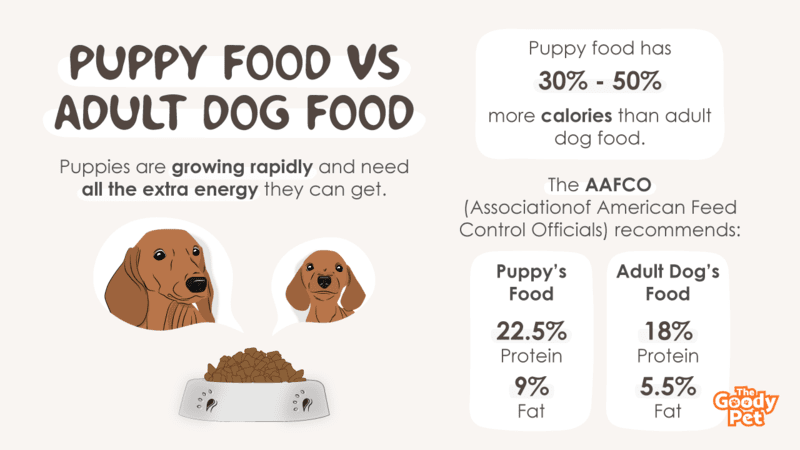For most dogs, puppy food is recommended until they are about one year old. After that time, adult dog food is usually better suited for their nutritional needs.
There are some differences between puppy and adult dog food. Puppy food tends to contain more calories than adult dog food because puppies are growing rapidly and need all the extra energy they can get. Also, most puppy foods contain higher levels of protein because puppies require a lot more protein than adults do in order to develop.
Is There A Difference Between Puppy Food And Adult Dog Food?

Compared with adult dog food, puppy food generally contains more:
- Calories
- Protein
- Fat
Puppies are growing rapidly and need more calories than adult dogs. Puppy food typically has 30% to 50% more calories than adult dog food.
The protein content in puppy food is higher than in adult dog food. This is because puppies need more protein in their diets to help them grow, while most adult dogs do not require as much protein.
The AAFCO, or Association of American Feed Control Officials has recommended that food for puppies contain at least 22.5% crude protein while adult meals should have 18%.
In addition to the protein content, puppy food also usually contains higher levels of fat than adult dog food. Fat is essential for a puppy’s health and energy, so it’s important that they get enough of it in their diet. Puppies are generally more active than adults and therefore, may burn off calories faster.
The AAFCO recommends that food for puppies contain at least 9% fat while adult meals should have 5.5%.
Can I Give My Adult Dog Puppy Food? How About Feeding A Puppy Regular Dog Food?

The question of whether not to feed adult food to puppies or puppy food to adult dogs is one that very many of us dog owners have had to consider at some point. The truth is that there is no definite and absolute answer. It depends on a lot of factors.
Size
The first is the size of the dog. With small dog breeds like Chihuahuas and Yorkies, you can actually feed adults food that is meant for puppies with no consequences.
This is because their small size means that the formulations for younger dogs contain enough maintenance nutrients in terms of quantity and proportion to support them. Feeding the small dog puppy food can also help with weight control and prevent obesity, which is a common problem with small dogs.
With larger dogs, on the other hand, feeding an adult food meant for puppies would be punishing them. This is because their energy needs are much higher than those of smaller dogs. You would therefore have to feed them a lot more than the recommended quantities to get the same maintenance levels of the required nutrients.
The Kibble Size
This applies mainly when it comes to feeding puppies food that is meant for adults. In addition to the recipes and nutrient balance, adult and puppy food differ when it comes to kibble sizes, especially with dry dog food. Feeding younger dogs food meant for adults is a choking hazard due to the large and often unmanageable size of the chewable.
The Formula
This also applies if you are considering feeding a very young puppy food meant for adults. You can tamper with growth and development unless you get a dog food brand that supplies the necessary micronutrients and superfood compounds necessary for the progress.
When Should You Switch Your Puppy To Dog Food?

Technically speaking, the puppy age lasts from birth to around 12 to 18 months, depending on the particular breed. After this age, your dog is no longer a puppy and has no business surviving on puppy food any further. This is because its body is more or less mature both physically and sexually and now only requires nutrients to maintain health and support daily life.
However, switching from puppy dog food to adult dog food is not as easy as simply waiting for its 18-month birthday to do a complete switch-up. You have to take a lot into consideration to ensure that the dog not only adapts to the new diet with ease but that its body is also ready.
Instead of stopping the puppy food cold turkey, consider slowly easing the old food out while introducing the new one. This is particularly useful when dealing with picky eaters who may need some time to get used to the new kibble size and texture as well as any new flavors. It also ensures that dogs get as much growth and development support as possible before they truly reach maturity.
Start switching puppy food to adult food slowly at about 9 to 12 months for small dogs, 12 to 14 months for medium ones and 18 to 24 months with large dog breeds.
As you do this, make sure to monitor things like weight, coat health, and appetite to make sure that the dog is taking to the new food properly and thriving just as consistently as it does on puppy dog food.
Is All Life Stages Dog Food Good For Puppies?

There is a recent trend in the dog food industry for options designed for all age groups, from puppies to adults and even elderly dogs. There has been a lot of controversy among dog owners and scientists in the community as to whether all three age groups actually get a fair deal when it comes to nutritional value from this one-size-fits-all type of formula.
Dog food formulated for all life stages is marked by a maintenance-focused nutrient balance with a lot of calories. This is useful for all ages as it helps to ensure that the dog remains energetic, whether young or old. However, this can be problematic with old dogs that are more prone to obesity and younger ones who need more growth support than energy.
Furthermore, these types of dog food rarely, if ever, have the nutrients required to support puppies in their growth. These include special vitamins, healthy fats, and other specific developmental compounds for different systems. This means that without supplementation, you may end up with a pooch jacked up on energy but with systems developing at a sub-optimal level and rate.
In conclusion, in all life stages, dog food is not the worst thing that you can feed your little puppy. There are actually some pretty awesome brands out there that provide meals with all the main nutrients required to keep your pooch alive and healthy, as you will see in our top three recommendations at the very end. Just make sure to identify and supplement any missing essential nutrients.
What Is The Difference Between Large Breed And Regular Dog Food?

What you feed a large dog and a small breed are not the same. We are not just talking about the quantity, which more or less goes without saying, given the specific calorie needs and appetite levels of both dogs. The differences include the nutrient balance, which is why it is never a good idea to mix, especially if you are considering feeding a larger breed food meant for a small or regular dog.
Before we get into the nutritional requirements, let’s take a look at what it means to be large, regular, and small. The size is actually more often than not determined based on weight, even though the height has also been factored in. Large dogs are dogs that are 55 to 60 pounds or more.
Medium dogs, on the other end, weigh 35 to 50 pounds at the point of physical maturity. Finally, small dogs are dogs that are less than 30 pounds, with the Chihuahua being the smallest at 6 pounds.
In addition to differences in quantity, the diet of a large dog requires more calorie-dense foods to keep up with the large body’s higher demands. Protein calories are particularly important for both energy and strong muscles. They are also prone to bone and joint issues, which makes skeletal health supplements like glucosamine and chondroitin very important in the diet.
Regular dogs, on the other hand, do not need as many calories. They also tend to have lower appetites and therefore eat less in terms of quantity. Finally, they rarely suffer any specific size-related issues and hardly ever require special supplementation in their diet.
Recommended Products
Ollie – This dog food brand was established to offer dogs of all ages and sizes access to high-quality dog food made from natural ingredients on a holistic level. In addition to using real proteins, they include superfood ingredients rich in vitamins, minerals, and antioxidants for overall health and optimal multi-system functioning of the dog at different ages.
They also include gut-friendly ingredients, which are particularly useful for puppies that have gut issues during weaning and older dogs with motility and digestion problems. These ingredients include thyme extract, chicory root, and kelp, as well as probiotics for dogs of all ages to enjoy.
Canidae All Life Stages Premium Dry Dog Food – This product stands out from many options out there in the market as it is formulated for not only all ages but also for all sizes. It is thus ideal if you have multiple different dogs of different ages in one home, so you don’t have to buy and keep track of different dog foods.
This dry dog food from Canidae is crafted using chicken and wholesome grains without adding corn, soy, or wheat. These offer the perfect balance of vitamins, antioxidants, probiotics, and grain-free, starch-free calories, useful at all stages of the dogs’ lives.
Pet Plate – Finally, you can check out Pet Plate if you want an all-ages dog food option for your furry best buddies. They offer cooked meals that are flash-frozen while fresh to ensure maintenance of the flavor and nutritional quality by the time it gets to the dog’s bowl.
It is made from high-quality, all-natural ingredients and is free from artificial additives and byproducts. This ensures that your dog grows up on the very best food out there in terms of nutritional value and quality.
Moreover, they use a special blend of vitamins and minerals, which come in particularly handy for the growing pup and the sickly senior dogs who require as much micronutrient support as possible.





